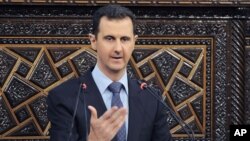CAIRO, Egypt - Syria's president has dismissed accusations his government was responsible for the recent massacre of 108 civilians in the town of Houla. He also charges that forces outside Syria are plotting to destroy the country.
Syrian government tanks shelled the beleaguered town of Houla on Sunday, while in Damascus, President Bashar al-Assad denied government responsibility for a massacre there two weeks ago.
In a speech to the newly-elected Syrian parliament, Assad appeared to defy mounting international criticism of his brutal response to the revolt against his rule.
He said the recent election was a response to legitimate popular demands, as well as a means to block foreign plots against his country.
He says that with recent reforms, the government is succeeding in combating outside designs on the country and at the same time answering a major part of the people's demands.
The Syrian president drew very little applause during his hour at the podium, unlike many previous addresses to parliament. Arab observers also pointed to the absence of Assad's Sunni vice president, Farouk al-Shara.
A November Arab League peace plan had designated Shara to conduct a dialogue with the opposition and to play a major role in a political transition.
President Assad insisted during his address that the 15-month conflict in Syria was not a “political” problem, but was instead the result of “terrorism.”
He says his government has tried to address the conflict with economic and political reforms, but the real problem facing Syria is terrorism. He says a terrorist plot seeks to destroy the nation.
Opposition leader Samir al Nashar told Alhurra TV that President Assad has once again tried to lecture the Syrian people.
He says Assad wants to teach people the meaning of nationalism, but that the people do not need any lessons from him. He says the president fails to see that he and his family are the main causes of the problem in Syria, rather than the outside plots he refers to.
University of Paris political science teacher Khattar Abou Diab says Assad is living in the past.
He says President Assad continues to deny what is happening, appearing more and more out of touch with reality, repeating tired slogans from the 1980s, despite the revolution raging all around him. He adds Assad appears to think he is still loved by his people and that he can impose his views on others.
Abou Diab also notes that Assad did not even mention the U.N.-Arab League peace plan mediated by former U.N. secretary general Kofi Annan. “Mr. Assad,” he says, “spoke only of a battle at hand, insisting that he will win it.”
Arab leaders urged Annan Saturday, during a meeting in Qatar, to put a time limit to his plan and to devise an alternative.
Syrian government tanks shelled the beleaguered town of Houla on Sunday, while in Damascus, President Bashar al-Assad denied government responsibility for a massacre there two weeks ago.
In a speech to the newly-elected Syrian parliament, Assad appeared to defy mounting international criticism of his brutal response to the revolt against his rule.
He said the recent election was a response to legitimate popular demands, as well as a means to block foreign plots against his country.
He says that with recent reforms, the government is succeeding in combating outside designs on the country and at the same time answering a major part of the people's demands.
The Syrian president drew very little applause during his hour at the podium, unlike many previous addresses to parliament. Arab observers also pointed to the absence of Assad's Sunni vice president, Farouk al-Shara.
A November Arab League peace plan had designated Shara to conduct a dialogue with the opposition and to play a major role in a political transition.
President Assad insisted during his address that the 15-month conflict in Syria was not a “political” problem, but was instead the result of “terrorism.”
He says his government has tried to address the conflict with economic and political reforms, but the real problem facing Syria is terrorism. He says a terrorist plot seeks to destroy the nation.
Opposition leader Samir al Nashar told Alhurra TV that President Assad has once again tried to lecture the Syrian people.
He says Assad wants to teach people the meaning of nationalism, but that the people do not need any lessons from him. He says the president fails to see that he and his family are the main causes of the problem in Syria, rather than the outside plots he refers to.
University of Paris political science teacher Khattar Abou Diab says Assad is living in the past.
He says President Assad continues to deny what is happening, appearing more and more out of touch with reality, repeating tired slogans from the 1980s, despite the revolution raging all around him. He adds Assad appears to think he is still loved by his people and that he can impose his views on others.
Abou Diab also notes that Assad did not even mention the U.N.-Arab League peace plan mediated by former U.N. secretary general Kofi Annan. “Mr. Assad,” he says, “spoke only of a battle at hand, insisting that he will win it.”
Arab leaders urged Annan Saturday, during a meeting in Qatar, to put a time limit to his plan and to devise an alternative.




